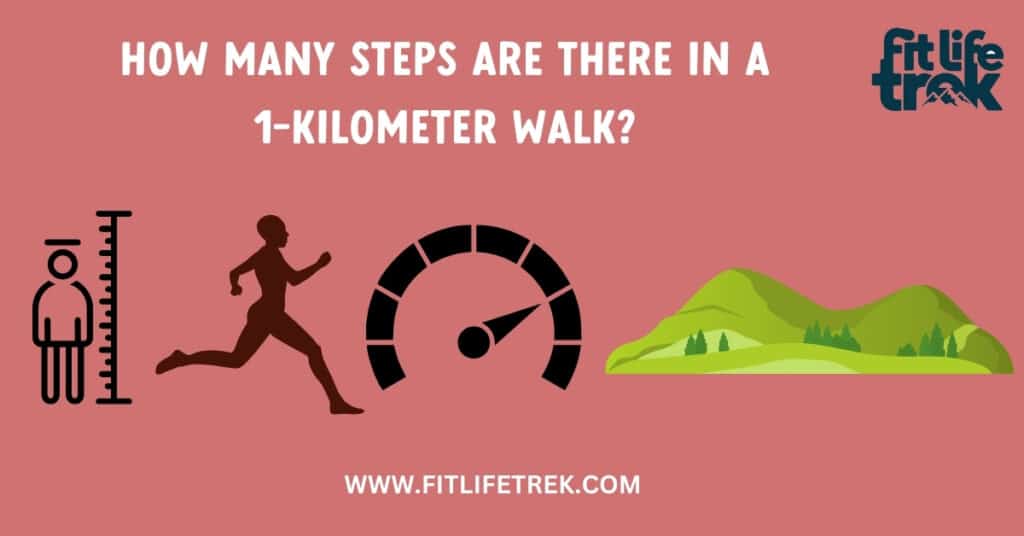Walking is putting one foot in front of the other to get around. It’s the simplest form of exercise that anyone can do. You don’t need any special gear, just comfortable shoes. Walking helps your heart, muscles, and bones stay strong. It can lift your mood and help you sleep better too. Plus, it’s a great way to explore your neighborhood or enjoy nature.
Ever wondered how long it takes to stroll a kilometer? You’re not alone. Whether you’re a fitness buff or just curious, knowing your walking speed can be eye-opening. It’s not just about distance – your pace tells a story about your health and fitness. Ready to uncover the secrets of your stride? Let’s take a walk through the world of kilometers and minutes. You might be surprised at what you discover about yourself along the way.
Walking a kilometer isn’t a one-size-fits-all journey. For most folks, it takes about 10 to 15 minutes. But your speed can vary wildly based on several factors. Your age, fitness level, and even the terrain play a part. Some zip through a kilometer in 8 minutes, while others enjoy a leisurely 20-minute stroll. The key is finding your own pace and understanding what affects it.
How Far is 1km in Minutes?
On average, it takes about 10-12 minutes to walk 1km at a moderate pace. But don’t let that number fool you – your mileage may vary! The time it takes to cover this distance depends on a variety of factors, from your fitness level to the terrain you’re tackling.
Consider this: A brisk walk might shave off a few minutes, while a leisurely stroll could stretch your 1km journey to 15 minutes or more. It’s all about finding your rhythm and understanding your body’s capabilities.
How Many Steps Are There in a 1-Kilometer Walk?
Ready for some number crunching? The average person takes about 1,250 to 1,550 steps to walk 1km. But before you start counting, keep in mind that this figure isn’t set in stone. Your step count can fluctuate based on:
- Your height
- Stride length
- Walking speed
- Terrain

For instance, someone with a longer stride might cover the same distance in fewer steps. On the flip side, navigating hilly terrain could increase your step count as you work harder to cover ground.
Average 1km Walk Time for Men by Age
Men’s walking speed often changes as they age. Young guys in their 20s might breeze through a kilometer in about 9 minutes. As they hit their 30s and 40s, it might stretch to 10 or 11 minutes. By their 50s and 60s, many men take around 12 to 14 minutes. Seniors over 70 might enjoy a more relaxed pace, taking 15 minutes or so. Remember, these are just averages. Plenty of older men outpace their younger counterparts
Age plays a significant role in determining walking speed. Let’s break down the average time it takes men of different age groups to walk 1km:
| Age Group | Average Time (minutes) |
| 20-29 | 9-10 |
| 30-39 | 10-11 |
| 40-49 | 11-12 |
| 50-59 | 12-13 |
| 60-69 | 13-14 |
| 70+ | 14-15 |
Remember, these are just averages. Your personal fitness level and other factors can influence your walking speed, regardless of age.
Average 1km Walk Time for Women by Age
The average 1km walk time for women varies by age. Younger women, in their 20s and 30s, generally walk faster. They can complete 1km in about 10 to 12 minutes. Women in their 40s and 50s might take around 12 to 15 minutes. As women age, their pace tends to slow. Those in their 60s or older often take 15 to 18 minutes or more to walk 1km. Fitness levels also affect walking speed.
Similarly, here’s a breakdown for women:
| Age Group | Average Time (minutes) |
| 20-29 | 10-11 |
| 30-39 | 11-12 |
| 40-49 | 12-13 |
| 50-59 | 13-14 |
| 60-69 | 14-15 |
| 70+ | 15-16 |
Again, these are general guidelines. Many women outpace these averages, while others might take a more leisurely approach to their 1km walk.
Factors Affecting the 1km Walk Time
Now, let’s delve deeper into the elements that can make or break your walking speed:
By Height
Tall people, rejoice! Your height gives you a natural advantage when it comes to walking speed. Longer legs typically mean a longer stride, which can help you cover ground more quickly. However, don’t despair if you’re on the shorter side – good technique and fitness can level the playing field.
Here’s a simple table that includes height and estimated stride length, along with the approximate time to walk 1km based on average walking speed:
| Height (cm) | Stride Length (cm) | Avg Walking Speed (km/h) | Time to Walk 1km (min) |
| 150 | 60 | 4.5 | 13.3 |
| 160 | 65 | 4.5 | 13.3 |
| 170 | 70 | 4.8 | 12.5 |
| 180 | 75 | 5.0 | 12.0 |
| 190 | 80 | 5.2 | 11.5 |
This table assumes a general relationship between height, stride length, and walking speed. The time is calculated by dividing 60 (minutes in an hour) by the walking speed to determine how long it takes to cover 1km at that speed.
By Fitness Level
It’s no surprise that your overall fitness plays a crucial role in your walking speed. Regular exercisers might find themselves breezing through a 1km walk, while those new to fitness might need to take it slower. The good news? Walking itself is an excellent way to boost your fitness level!
By Stride Length
Your stride length – the distance between your feet as you walk – can significantly impact your walking time. A longer stride covers more ground with each step, potentially speeding up your 1km walk. But be careful not to overstretch; an unnaturally long stride can lead to discomfort and inefficiency.
By Terrain
Factors affecting the 1km walk time can vary greatly by terrain. Flat surfaces make walking easier and faster. Rough terrain like gravel or sand can slow you down. Uphill paths require more effort, reducing speed. Walking downhill can be faster, but requires careful footing. Wet or slippery surfaces add extra caution, affecting time.
Uneven ground may cause balance issues, slowing pace. Muddy paths can make walking difficult and tiring. In forests, obstacles like roots or rocks can impact speed. Smooth pavement is the best for a quick 1km walk. Weather conditions, like rain, also influence the time.
The ground beneath your feet matters more than you might think. Here’s how different terrains can affect your walking time:
- Flat pavement: The ideal surface for speed, allowing for a consistent pace.
- Grass: Slightly slower due to the softer surface.
- Sand: Significantly slower and more challenging, as your feet sink with each step.
- Uphill: Expect to slow down considerably as you work against gravity.
- Downhill: You might pick up speed, but be cautious to maintain control.
Surroundings
The time it takes to walk 1km can be influenced by several factors. The terrain plays a big role. Walking on flat ground is easier and faster than walking uphill. Weather conditions also matter. Rain, wind, or extreme temperatures can slow you down. The type of shoes you wear affects your comfort and speed. Crowded areas can force you to walk slower.
Walking in well-lit and safe places may encourage a faster pace. Noise levels, like busy streets, might distract or slow you down. The surface, whether it’s pavement or dirt, impacts your speed. Your energy level or fitness also makes a difference. Finally, walking with others or alone can affect your pace.
Your environment plays a bigger role in your walking speed than you might realize. Consider these factors:
- Weather: A brisk walk on a sunny day might feel effortless, while battling wind or rain could slow you down.
- Crowded areas: Navigating through busy streets or parks might require frequent stops and starts.
- Scenery: A beautiful view might tempt you to slow down and enjoy the sights.
- Urban vs. rural: City walks often involve navigating obstacles like crosswalks, while rural paths might offer a more consistent pace.
Is Walking 1km in 10 Minutes Good?
In a word: Yes! Covering 1km in 10 minutes puts you at a brisk walking pace of 6 km/h or about 3.7 mph. This is an excellent speed for improving cardiovascular health and burning calories. If you can maintain this pace, you’re doing great!

But don’t get discouraged if you’re not quite there yet. Remember, any walking is better than no walking at all. Start where you are, and gradually work on increasing your speed over time.
What Are the Health Benefits of Walking 1 km Daily?
Walking 1 km daily offers many health benefits. It helps improve heart health by boosting blood circulation. Walking also strengthens muscles, especially in your legs. It can help you burn calories and manage your weight.
Regular walking improves mood and reduces stress. It’s good for your bones, keeping them strongLacing up your shoes for a daily 1km walk can do wonders for your health. Let’s explore some of the key benefits:
Increase Blood Flow
Walking 1 km daily helps improve blood circulation. Better circulation delivers more oxygen to your muscles and organs. This can boost your energy levels. It also supports heart health by lowering blood pressure. Regular walking can reduce the risk of heart disease. Overall, it promotes a healthier body and mind.
Walking gets your heart pumping, improving circulation throughout your body. This boost in blood flow can help:
- Reduce the risk of heart disease
- Lower blood pressure
- Improve cognitive function
Bone Strength
Walking 1 km daily can boost bone strength. It helps maintain bone density. This reduces the risk of osteoporosis. Regular walking promotes better joint health. Strong bones support overall mobility. A simple daily walk can make a big difference.
Each step you take puts gentle stress on your bones, encouraging them to become stronger. This weight-bearing exercise is crucial for:
- Maintaining bone density
- Reducing the risk of osteoporosis
- Improving overall skeletal health
Enhance Focus
It increases blood flow to the brain. This can help improve concentration and creativity. Regular walking reduces stress and anxiety. It also enhances your mood. Overall, it keeps your mind sharp and focused.
A daily walk can clear your mind and sharpen your focus. Studies have shown that regular walking can:
- Improve concentration
- Boost creativity
- Reduce stress and anxiety
Burn Calories
It boosts your metabolism. This can aid in weight management. Even a short walk contributes to overall fitness. It’s a simple way to stay active. Regular walking promotes a healthy lifestyle.
While it might not seem like much, a 1km walk can help you burn calories and maintain a healthy weight. On average, you can expect to burn:
- 50-60 calories for a 60kg person
- 60-70 calories for a 75kg person
- 70-80 calories for a 90kg person
Improved Metabolism
It helps your body burn more calories. This can aid in weight management. Regular walking also improves digestion. A faster metabolism means more energy throughout the day. Overall, it’s a simple way to stay healthy.
Regular walking can give your metabolism a much-needed boost. This can lead to:
- Increased energy levels
- Better weight management
- Improved overall health
Lower Blood Sugar
It improves insulin sensitivity, making it easier for your body to use glucose. Regular walking helps control weight, which is important for blood sugar management. It also reduces stress, contributing to better overall health. Even a short walk can boost your mood and energy. Incorporating this simple habit can lead to long-term health benefits.
For those managing diabetes or at risk of developing it, a daily walk can be a game-changer. Walking helps:
- Improve insulin sensitivity
- Regulate blood sugar levels
- Reduce the risk of type 2 diabetes
7. Meeting New People
Parks and walking paths are great places to encounter others. Engaging in a simple activity like walking makes it easy to strike up conversations. You might join a walking group or meet neighbors. Socializing while exercising boosts your mood. Building connections can enhance your overall well-being.
Don’t underestimate the social benefits of a daily walk! Whether you join a walking group or just smile at passersby, walking can:
- Reduce feelings of isolation
- Improve mood and mental health
- Create opportunities for new friendships
8. Interaction with Nature
It lets you enjoy fresh air and natural scenery. This interaction can boost your mood and reduce stress. Being outdoors also increases your Vitamin D levels. Regular walks help you feel more relaxed and focused. Overall, nature can enhance your well-being.
Taking your 1km walk outdoors allows you to connect with nature, which has numerous benefits:
- Reduced stress levels
- Improved mood
- Enhanced vitamin D absorption from sunlight
How Many Calories Can I Burn Per Day?
The number of calories you burn each day depends on various factors. Your age, weight, and activity level all play a role. On average, a person burns about 1,800 to 2,400 calories daily. Simple activities like walking or cleaning can add to this total. Understanding your personal burn rate can help with fitness goals.
To increase calorie burn, consider regular exercise. Activities like running, cycling, or swimming can be very effective. Strength training also helps build muscle, which burns more calories. Tracking your daily activities can provide valuable insights. Small changes in your routine can lead to better results over time.
The number of calories you burn during your 1km walk depends on various factors, including your weight, walking speed, and terrain. Here’s a rough estimate:
| Weight (kg) | Calories Burned (1km walk) |
| 50 | 40-45 |
| 60 | 50-55 |
| 70 | 60-65 |
| 80 | 70-75 |
| 90 | 80-85 |
Remember, these are just estimates. Your actual calorie burn may vary based on your individual metabolism and the intensity of your walk.
Is Walking 1 km a Day Able to Lower Belly Fat?
Walking 1 km a day can help lower belly fat. It burns calories and promotes weight loss. Regular walking increases metabolism and tones muscles. While it may not target belly fat specifically, it contributes to overall fat loss. Consistency is key for seeing results over time.

In addition to walking, a balanced diet is important. Combine walking with healthy eating for the best effect. Staying active in other ways can also help. Aim for at least 30 minutes of exercise daily. Together, these habits support a healthier lifestyle.
While spot reduction isn’t possible, walking 1km daily can contribute to overall fat loss, including belly fat. Here’s why:
- Calorie burn: Regular walking creates a calorie deficit, essential for fat loss.
- Metabolic boost: Walking increases your metabolism, helping you burn more calories throughout the day.
- Stress reduction: Lower stress levels can help reduce cortisol, a hormone linked to belly fat storage.
For best results, combine your daily 1km walk with a balanced diet and other forms of exercise.
How Much Time Will It Take for a Fit Person to Walk?
A fit person might cover 1km in as little as 8-9 minutes at a brisk pace. However, fitness isn’t just about speed. A fit individual might also:
- Maintain a consistent pace over longer distances
- Recover more quickly after walking
- Find it easier to tackle challenging terrains
Remember, being “fit” doesn’t always mean being the fastest. It’s about overall health, endurance, and enjoying your physical activities.
Is Walking 1km Daily Good?
Walking 1 km daily is a simple way to stay active. It helps improve your heart health and boosts circulation. This gentle exercise can strengthen your muscles and bones. Plus, it’s easy to fit into your routine. A daily walk can enhance your mood and reduce stress.
Additionally, walking can aid in weight management. It burns calories while being low-impact on your joints. Regular walking promotes better sleep and increases energy levels. You can also use this time to think or enjoy music. Overall, walking 1 km daily brings many health benefits.
Walking 1km daily is an excellent habit that can significantly improve your health. Here’s why it’s beneficial:
- Achievable goal: It’s a distance that most people can manage, even if they’re new to exercise.
- Time-efficient: It typically takes only 10-15 minutes, making it easy to fit into busy schedules.
- Low-impact: It’s gentle on your joints, making it suitable for most people.
- Consistent exercise: Daily walks help establish a regular exercise routine.
- Cumulative benefits: Over time, these daily walks add up to significant health improvements.
How Long Does It Take to Walk 1km on a Treadmill?
Walking 1km on a treadmill typically takes about the same time as walking outdoors – around 10-12 minutes at a moderate pace. However, treadmill walking offers some unique advantages:
- Consistent pace: You can set your speed and maintain it easily.
- Incline control: Adjust the incline to simulate different terrains and intensify your workout.
- Weather-independent: No need to worry about rain, wind, or extreme temperatures.
- Trackable progress: Most treadmills offer detailed stats on your walk.
Remember to account for the lack of wind resistance and the moving belt when comparing treadmill walking to outdoor walking.
How Can a Beginner Make a Walking Routine?
Starting a walking routine is simple. First, choose a time that works for you. It could be in the morning or evening. Aim for a duration of 15 to 30 minutes. Gradually increase your time as you get more comfortable.

Next, pick a safe and pleasant route. Walking in parks or quiet neighborhoods can be enjoyable. Wear comfortable shoes to avoid blisters. You can also listen to music or podcasts for extra motivation. Finally, track your progress to stay motivated and celebrate your achievements!
Starting a walking routine is a great way to improve your fitness. Here are some tips to get you started:
Practice the Posture
Good posture is important when walking. Stand up straight with your shoulders back. Keep your head up and look forward. Your arms should swing gently at your sides. This helps you walk efficiently and avoid injury.
Start by walking for short periods. Aim for 10 to 15 minutes each day. Gradually increase your time as you feel comfortable. Pay attention to how your body feels. Adjust your posture as needed to stay relaxed and balanced.
Clothing
Choosing the right clothing is essential for a walking routine. Wear comfortable, breathable fabrics to stay cool. Opt for shoes with good support to protect your feet. Loose-fitting clothes allow for easy movement. Don’t forget to dress for the weather to stay safe and enjoy your walk.
In colder months, layer your clothing to keep warm. In hot weather, light colors can help reflect the sun. A hat and sunglasses can protect you from UV rays. Always choose moisture-wicking materials to stay dry. Proper clothing makes your walks more enjoyable and encourages consistency.
Footwear
Choosing the right footwear is essential for a walking routine. Look for shoes that fit well and provide support. Cushioned soles help absorb impact and keep your feet comfortable. Make sure your shoes have good traction for safety. Investing in quality footwear can make walking more enjoyable.
Once you have the right shoes, break them in gradually. Start with short walks to avoid blisters. Pay attention to how your feet feel as you walk. If you notice any discomfort, adjust your shoes or walking style. A good fit will motivate you to keep walking regularly.
Safety Tips for the 1 km Daily Walk
Walking 1 km can be fun and safe. Always choose a well-lit path. Avoid busy roads and crowded areas. Wear comfortable shoes to prevent blisters. Stay aware of your surroundings at all times.
It’s important to stay hydrated. Bring a water bottle, especially on warm days. If walking early or late, wear bright clothing. Consider walking with a friend for added safety. Trust your instincts—if something feels off, don’t hesitate to leave.
Stay safe while enjoying your daily walk with these tips:
- Be visible: Wear bright or reflective clothing, especially in low light.
- Stay hydrated: Bring water, especially on longer walks or in hot weather.
- Be aware: Pay attention to your surroundings and potential hazards.
- Carry ID: Bring identification and emergency contact information.
- Use sidewalks: When available, stick to sidewalks or designated walking paths.
- Face traffic: If you must walk on the road, walk against traffic.
- Warm up: Start with a few stretches to prepare your muscles.
- Cool down: Gradually slow your pace at the end of your walk.
Read More About: Conquer 5 Km: Calculate Your Steps & Walk Your Way to Fitness
How Many Steps are in 1 km: Step-by-Step Conversion Guide
Conclusion
Walking 1km is more than just a distance – it’s a journey towards better health, both physical and mental. Whether you’re aiming to improve your fitness, lose weight, or simply enjoy the outdoors, a daily 1km walk is an excellent place to start.
Remember, the key to success is consistency. Start where you are, set realistic goals, and gradually increase your pace and distance as you become more comfortable. Before you know it, that 1km walk will become an essential part of your day, bringing with it a host of health benefits and a sense of accomplishment.
So, lace up those shoes, step out the door, and embark on your 1km adventure. Your body and mind will thank you for it!
FAQ’s
How many steps are in 1 km? A: On average, there are about 1,250 to 1,550 steps in 1 km, depending on your stride length.
Can walking 1 km a day help with weight loss? A: Yes, walking 1 km daily can contribute to weight loss when combined with a healthy diet and overall active lifestyle.
Is it better to walk faster or longer? A: Both have benefits. Walking faster burns more calories in less time, while walking longer improves endurance. Ideally, incorporate both into your routine.
How can I increase my walking speed? A: Focus on improving your posture, lengthening your stride slightly, swinging your arms, and gradually pushing yourself to walk faster over time.
Is walking 1 km the same as running 1 km in terms of health benefits? A: While both are beneficial, running generally burns more calories and provides a more intense cardiovascular workout. However, walking is lower impact and may be more sustainable for some people.

